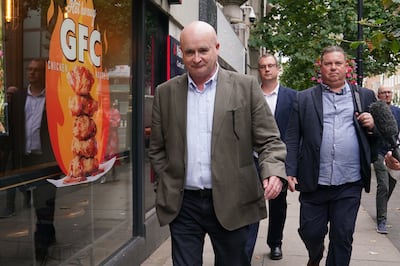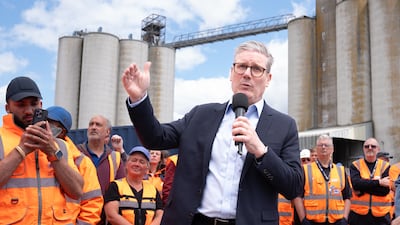The TUC Congress in Brighton was a dismal affair. Attendance was poor, the delegates were in a sombre mood. The Tories were in their pomp and it honestly felt as though the trade union movement did not have a future.
No one was listening to them, they had no ‘in’ with the government, they were seen as belonging to a bygone age – the images of which conjured up pictures of Britain on its knees, with bags of rubbish piling up on the streets, three-day weeks and electricity cuts. Their only role appeared to be as alternative HR adviser, able to deal with individual complaints. As for mass protest, certainly not, the lifeblood had drained from them.
That was several years ago. I was there as a reporter, and it was grim.
Next month, the unions will assemble again, also in Brighton. This time, the atmosphere will be very different. Labour is in Downing Street once more, with a thumping majority. Resourceful leaders, notably Mick Lynch from the RMT, train drivers’ union, have shown what can be achieved with targeted, staggered industrial action.

The unions are back; and with them the spectre of strikes and promises of ever higher public sector pay awards. Already, in the brief period since Labour won the election, we’ve seen the granting of two above-inflation rises for junior doctors and train drivers. GPS are demanding better terms or they will strike. GPs! Others will follow.
That is bound to occur under a new law to be proposed by Labour when Parliament returns from the summer break time. In the autumn, it will seek to repeal the Trade Union Act 2016, which set legal thresholds for how much support strike ballots require. Under the statute, brought in by Lord (David) Cameron’s government, at least half a union’s membership must take part in a strike vote for it to be valid. Further, for the “important public services” such as the NHS and transport, at least 40 per cent must have voted for action.
Angela Rayner, the Deputy Prime Minister, is determined to bring forward the Employment Rights Bill, which would enable strikes to be called with the support of far fewer members.
Given the scale of Labour’s victory, plus the fact that a substantial number of its MPs are on union tickets, their offices bankrolled by unions, along with the party’s recent election campaign, the proposal is bound to soon become law.
When Prime Minister Keir Starmer addresses the packed hall at their conference he will do so as the conquering hero, as the person who undid 14 years of Conservative rule. Be in no doubt, however, where power truly resides. If those listening and applauding wanted him removed, they could achieve it.
Suddenly, it does feel like the 1970s all over again. Then, it took Margaret Thatcher to drive the unions away. Unpredictably, that push was reinforced when Labour next took charge. Tony Blair created ‘New’ Labour to distance himself and his colleagues from the old. They had little time for the unions. The New Labour era was very much associated with nodding in the other direction. Indeed, Peter Mandelson, then Trade and Industry Secretary, said that New Labour was “intensely relaxed about people getting filthy rich as long as they pay their taxes”.
Already, the Starmer government seems set on returning to old Labour ways and values. They will say not, but the pace of reversal is startling, and alarming.
Mr Mandelson made his ‘love the rich’ comment as it became known, on a fact-finding mission to Silicon Valley. He was assuring a group of Hewlett-Packard senior executives as to where the Blair government stood.
He returned from that trip, enthused that Britain needed to replicate what he’d seen, and attract foreign investors. The country should have a modern, go-getting, world-beating, anything-is-possible, economy built around tech and growth industries.
In their run-up to winning, Mr Starmer and Rachel Reeves, now Chancellor, made it their task to woo the City. Day after day, for several months, one or both, was to be found at a breakfast, lunch, dinner with big business chiefs, persuading them that a Starmer administration would be good for business, that they were listening and these titans had nothing to fear. Part of the shtick as well was that they could be trusted with the economy.
That is not how it appears today. They have caved in to wage requests which, while they are in the public sector, only increase pressure on the private to follow suit. Not only that. Mr Starmer and Ms Reeves spent their time assuring the company leaders that they would behave responsibly where managing the economy was concerned, that they would be acting cautiously and bringing down inflation was a priority.
Then, bang. Inflation-exploding increases are handed down. More are certainly to come. If not, strike action will result – which this government will find hard to resist.
There was more to Labour’s overtures to the City. They said they would reduce red tape and bureaucracy. In house building and planning, moves are afoot to make this happen.
But wooing vitally desired capital is about much more than scrapping arcane rules and regulations. It’s to do with selling, creating an atmosphere that tells investors their funding is genuinely appreciated, that the authorities are with them and will endeavour to ensure their faith in the UK is well spent.
Or else, it’s simple: they will go elsewhere, to another nation that promises and delivers more. Mr Starmer would be foolish if he failed to understand just how competitive this global market remains – turning Britain back conveys a terrible image.
So, at Brighton, he must deliver two messages. One is of gratitude and empathy; the other is of reality, as to where Britain sits today and what it needs to do to attract investment that creates jobs. It wants, as Mr Mandelson said, to replicate Silicon Valley. Mr Starmer may wish to omit the ‘love the rich’ bit on this occasion, but neither should he lean too much the other way. It’s a fine balance and he must stick to it.


